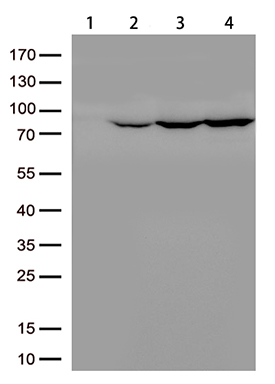PDE10A Mouse Monoclonal Antibody [Clone ID: OTI1C9]
CAT#: CF500625
Carrier-free (BSA/glycerol-free) PDE10A mouse monoclonal antibody, clone OTI1C9 (formerly 1C9)
Formulation: Standard
Specifications
| Product Data | |
| Clone Name | OTI1C9 |
| Applications | IHC, WB |
| Recommended Dilution | WB 1:500, IHC 1:50 |
| Reactivities | Human, Mouse, Rat |
| Host | Mouse |
| Isotype | IgG2b |
| Clonality | Monoclonal |
| Immunogen | Full-length protein expressed in 293T cell transfected with human PDE10A expression vector |
| Formulation | Lyophilized powder (original buffer 1X PBS, pH 7.3, 8% trehalose) |
| Reconstitution Method | For reconstitution, we recommend adding 100uL distilled water to a final antibody concentration of about 1 mg/mL. To use this carrier-free antibody for conjugation experiment, we strongly recommend performing another round of desalting process. (OriGene recommends Zeba Spin Desalting Columns, 7KMWCO from Thermo Scientific) |
| Purification | Purified from mouse ascites fluids or tissue culture supernatant by affinity chromatography (protein A/G) |
| Conjugation | Unconjugated |
| Storage | Store at -20°C as received. |
| Stability | Stable for 12 months from date of receipt. |
| Predicted Protein Size | 88.4 kDa |
| Gene Name | phosphodiesterase 10A |
| Database Link | |
| Background | Phosphodiesterases (PDEs) are a family of related phosphohydrolyases that selectively catalyze the hydrolysis of 3'cyclic phosphate bonds in adenosine and/or guanine 3',5' cyclic monophosphate (cAMP and/or cGMP). They regulate the cellular levels, localization and duration of action of these second messengers by controlling the rate of their degradation. There are 11 subtypes of PDEs, named PDE1-11; PDE4, 7 and 8 selectively degrade cAMP, PDE5, 6 and 9 selectively degrade cGMP and PDE1, 2, 3, 10 and 11 degrade both cyclic nucleotides. PDEs are expressed ubiquitously,with each subtype having a specific tissue distribution. These enzymes are involved in many signal transduction pathways and their functions include vascular smooth muscle proliferation and contraction, cardiac contractility,platelet aggregation, hormone secretion, immune cell activation, and they are involved in learning and memory. |
| Synonyms | FLJ11894; FLJ25677; HSPDE10A |
| Reference Data | |
| Protein Families | Druggable Genome |
| Protein Pathways | Progesterone-mediated oocyte maturation, Purine metabolism |
Documents
| Product Manuals |
| FAQs |
| SDS |
Resources
| Antibody Resources |
Other Versions
| SKU | Description | Size | Price |
|---|---|---|---|
| TA500625 | Anti-PDE10A mouse monoclonal antibody, clone OTI1C9 (formerly 1C9) |
USD 447.00 |
|
| TA500625AM | Anti-PDE10A mouse monoclonal antibody, clone OTI1C9 (formerly 1C9), Biotinylated |
USD 509.00 |
|
| TA500625BM | Anti-PDE10A mouse monoclonal antibody, clone OTI1C9 (formerly 1C9), HRP conjugated |
USD 509.00 |
|
| TA500625S | Anti-PDE10A mouse monoclonal antibody, clone OTI1C9 (formerly 1C9) |
USD 200.00 |
{0} Product Review(s)
Be the first one to submit a review






























































































































































































































































 Germany
Germany
 Japan
Japan
 United Kingdom
United Kingdom
 China
China
















